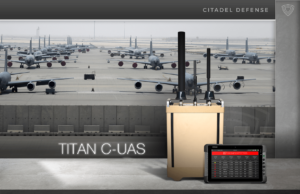
Counter-drone provider Citadel Defense is mounting a novel defense against spoofing tactics.
The company today announced the release of new software incorporating deepfake neural networks to defend against adversarial spoofing tactics.
The software can – according to a company release — “combat growing enemy tactics that attempt to confuse existing and security intelligence equipment as spectrum superiority becomes more important.”
Dubbed Generative Adversarial Networks, the solution will be deployed to Citadel’s Titan C-UAS platform.
“Just like anti-virus programs have methods to detect software exploits, Titan has automated methods that proactively defend against spoofing exploits,” Christopher Williams, CEO of Citadel Defense said.
“Adding new deep learning capabilities to Titan helps blind the drone-equipped enemy and deny them any advantage or safe haven in contested and complex radiofrequency environments.”
Using proprietary image generation algorithms, these “discrimination classification models” help determine whether a signal detected is a real drone or a generated signal by the adversary trying to trick existing signal intelligence equipment.
Last month, the counter-drone provider launched new AI/machine-learning software for its Titan array the company said outpaces other anti-drone sensors that use radar or cyber takeover tactics, which may be limited by ground clutter or responsiveness to new threats.
In December, the California-based company completed a six-month deployment of its anti-drone solutions for three undisclosed federal agencies.
In September, Citadel partnered with the U.S. Air Force to protect military assets from drone assaults on the heels of an attack on Saudi oil assets – partially by drone.
Earlier this year, the company signed an agreement with the U.S. Defense Logistics Agency. The initiative deploys counter-drone measures in support of Special Operations Command requirements.
“[Titan’s] ease of use coupled with the fact that it can operate in environments where communications are critical, like major cities, airports or aboard large ships, provide users with a flexible solution for many missions,” Williams said of the agreement.
“Citadel’s escalating countermeasure approach is a unique advantage for customers because it can effectively detect, identify, and defeat drones with limited collateral affects to other important signals like Wi-Fi and Bluetooth communications.”
Jason is a longstanding contributor to DroneLife with an avid interest in all things tech. He focuses on anti-drone technologies and the public safety sector; police, fire, and search and rescue.
Beginning his career as a journalist in 1996, Jason has since written and edited thousands of engaging news articles, blog posts, press releases and online content.
Email Jason
TWITTER:@JasonPReagan
Subscribe to DroneLife here.